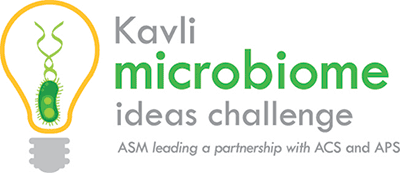American Society for Microbiology Launches the Kavli Microbiome Ideas Challenge In Partnership with Two Leading Scientific Societies
WASHINGTON, D.C., May 13, 2016 – In support of a National Microbiome Initiative launched by the White House Office of Science and Technology Policy and to accelerate discovery in the field of microbiome research, The Kavli Foundation has committed $1 million to a Kavli Microbiome Ideas Challenge supporting development of next generation scientific tools for investigating life on a microbial scale. The Kavli Ideas Challenge will be led by the American Society for Microbiology (ASM), and carried out in partnership with the American Chemical Society (ACS) and American Physical Society (APS).
“This initiative is an important step to expand our understanding of the pivotal role of microbes in the ecosystem,” said Lynn Enquist, ASM President.
“ASM is honored to have been chosen by The Kavli Foundation to lead this effort to bring cross-cutting research into the forefront to better understand how microbes interact with each other and their environments,’ said Stefano Bertuzzi, CEO, ASM. “Microbiome research is a high priority for ASM and the result of this challenge could help develop groundbreaking tools to accelerate and enhance our knowledge of microbiomes.”
Recent discoveries have revealed that the vast majority of life on our planet is microbial. Bacteria, viruses, and fungi are both ubiquitous and critically important in human health and the environment. However, still lacking is an understanding of how microbes function – how they communicate with each other and their hosts, how they interact in complex communities, and the role that specific microbes play in regulating host physiology and health. The focus of the Kavli Microbiome Ideas Challenge is to develop new tools and methods that specifically catalyze discovery in understanding microbial function.
“The Kavli Foundation has always sought to catalyze collaborations at the intersection of scientific fields,” said Robert Conn, President and CEO of The Kavli Foundation. “By funding this Kavli Ideas Challenge we intend to do just that by harnessing the ingenuity of scientists working across a wide range disciplines.”
“This Kavli Ideas Challenge will catalyze development of new experimental tools that help define specific cause and effect relationships in microbial function,” said Miyoung Chun, Executive Vice President of Science Programs at The Kavli Foundation. “We are thrilled that ASM, ACS, APS are partnering to realize this goal.”
The Kavli Ideas Challenge invites the broad scientific community – including microbiologists, nanoscientists, neuroscientists, engineers, chemists, materials scientists, physicists and others – to submit their ideas for groundbreaking experimental tools and methods for understanding microbial function. ASM, ACS and APS, through the extraordinary breadth of scientific expertise represented by their collective membership, will ensure that the Kavli Ideas Challenge generates and selects the most innovative proposals. The $1 million commitment from The Kavli Foundation will provide support for winning ideas to be launched.
“I view the Kavli Microbiome Ideas Challenge as a catalyst, a program that brings new approaches and new people into the field to rapidly increase our understanding of microbial communities’ functions and mechanisms,” said Tim Donohue, Past President, ASM.
Applications to the Kavli Ideas Challenge will be solicited in summer of 2016. For further information and to sign up for updates, please visit: http://www.kavlichallenge.org/
Contact: Tawanda W. Johnson, APS, tjohnson@aps.org, (202) 662-8702

APS Media Contacts
General Media Inquiries
media@aps.org
James Riordon
Head of Media Relations
riordon@aps.org
(301) 209-3238
Tawanda W. Johnson
Press Secretary
tjohnson@aps.org
(202) 662-8702
Matteo Rini
Media Relations, Journals
press@aps.org
Using the APS Logo
About APS
The American Physical Society is a nonprofit membership organization working to advance and diffuse the knowledge of physics through its outstanding research journals, scientific meetings, and education, outreach, advocacy, and international activities. APS represents more than 50,000 members, including physicists in academia, national laboratories, and industry in the United States and throughout the world.

